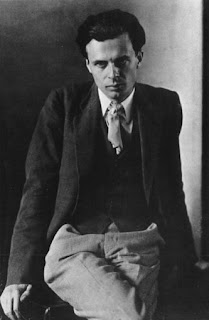
In the future I hope to read Aldous Huxley’s Brave New World. I have read George Orwell’s 1984 and loved it. I think it will be interesting to juxtapose the two together and see what my thoughts are. The book is:
“a darkly satiric vision of a "utopian" future—where humans are genetically bred and pharmaceutically anesthetized to passively serve a ruling order. A powerful work of speculative fiction that has enthralled and terrified readers for generations, it remains remarkably relevant to this day as both a warning to be heeded as we head into tomorrow and as thought-provoking, satisfying entertainment.” (Chapters Indigo)
Here is a little information about Aldous Huxley:
• Born July 26 1894 in Goldaming, Surrey
• His father was a editor, poet and biographer, his mother died when he was 14
• He attended Eton college in Berskshire and received his B.A. in English in 1916
• During his time at college he developed keratitis punctata, a condition blinding him for about 18 months. One eye recovered sufficiently and he had special reading glasses.
• His first novel was Crime Yellow and was released in 1921
• Brave New World was published in the 1930s
• In 1962 Island was published and was of similar territory to Brave New World, dealing with an utopian place
• Huxley died November 22, 1963 in Los Angeles
(Online Literature)
Chapters Indigo. Brave New World. Unknown. 25 Sept. 2007.
http://www.chapters.indigo.ca/books/Brave-New-World-Aldous-Huxley/9780060850524-item.html?ref=Books%3a+Search+Top+Sellers
Online Literature. Aldous Huxley. 24 Feb 2006. 25 Sept. 2007.
http://www.online-literature.com/aldous_huxley/
